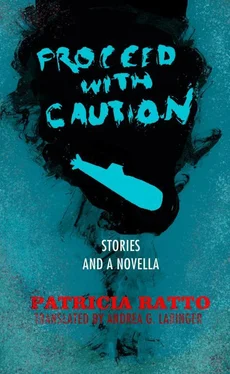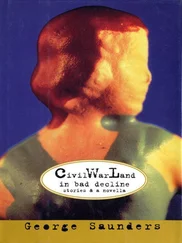We keep traveling toward the patrol area we’ve been assigned. Today we’re not listening to the radio, so we don’t know anything about what’s happening outside. We go about our daily routine, nothing new, it’s an empty day. Empty like the day of the chest pain that knocked me to the floor of the engine room and all the ones that followed until the moment when the noise woke me up. Days I can’t quite recall, which disappeared from my memory as if a worm had eaten them, like the house borer that attacked the tie beams in the little chalet. It was about waking up in the middle of the night and hearing the sound of the house borer, a unique, recognizable sound, it was turning on the light, staring up at the portion of wooden roof I could see and not finding anything. The house borer works from the inside, the beetle eats greedily, patiently, until the wood weakens, hardly more than sawdust, and breaks. Sometimes I would wake up all sweaty, with a strong pressure in my chest, convinced that the roof had fallen down on us. During the day we didn’t hear it; the noises of activity during the daylight hours tend to cover it up completely. When I was on campaign, days submerged in the sea, I had the feeling that all of it was just a distant nightmare, a nasty trick played by my imagination. But it was a question of putting my feet back on the ground, going back home, and, once night fell, hearing it again. Everyone seemed to have solutions to offer, some of them obviously ridiculous, others impossible. In the end we found a company that guaranteed its elimination. And then, when they finished the job and made sure the extermination was thorough and we thought we were going to finally get some peace, we became even more alert to it than before; I remember how Mama suddenly turned down the volume on the radio: Just a minute, let me listen, she would say to us, and we’d all wait quietly—María, my mother, and I—to see if we could hear the house borer. I also remember sitting around chatting and suddenly falling silent, in the middle of dinner, not saying a word to one another, each of us looking up slyly, out of the corners of our eyes, as if focusing on some spot on the ceiling would help us hear better, and then taking up the discussion again if nothing had happened, as if it had just been a natural pause in a family’s dinner conversation. Once I came home from the base and found Mama sitting at the kitchen table with Doña Aurelia, a mate in her hand, both of them silently looking at the ceiling. Sometimes we thought the noise had gone away, and with it the house borer, because we never did see that house borer, we heard it: the noise was the beetle. Other times, I woke up again in the middle of the night, convinced I had heard it; I’d turn on the light like before, like always, and I couldn’t tell if I was really hearing it or only thought I did, the illusion of sound, like an echo lodged in my memory. Maybe it never left; it hung around quietly for a while to confuse us and came back later, not for the tie beams in the little chalet, but to swallow up those days of my life that I can’t get back again and try to reassemble hypothetically, to keep everything from collapsing on me suddenly—life, you know?—as if it was the roof of the chalet, and to keep it from squashing me altogether. Then I imagine that one of the boys who worked with me in those days trying to fix the engine we could never manage to jump-start, Albaredo maybe, cried out, yelling that I was on the destroyed floor, unconscious, and a few of them together pulled me out through the forward hatch and the ambulance came and took me to the Naval Hospital, and meanwhile someone called the neighbor lady because at our house—even though we’ve been asking for years—they still haven’t put in a phone, to notify María, taking care not to frighten Mama, and I was there for one day, connected to monitors, with medication and some tests, and they must have told them later that it was nothing serious, that it had just been a scare, that maybe I should watch what I ate, that I should use less salt and stuff like that, and that I should rest a little and then just go back to work, to the sub and the engines, since that’s my thing, after all. And I must have used those days to rest and recover, to finish reading that book I left off at the war scene, the one with the horse whose back was raw, which left such an impression on me. That’s what happened to me, I repeat it in my head over and over again, with some variations, but more or less the same, so often that I don’t know anymore if I made it up or if it really took place, like what happened to us with the house borer, which we don’t know if it was or wasn’t there. Anyway, that’s starting to happen to me with other things, too; today I tried to remember Javier’s birthday, my cousin who’s like a brother to me, and I couldn’t, or that way María has of drying her hands on her apron when she’s finished washing the dishes, and I always used to be able to see her as if she was right in front of me and now I can only capture it in a couple of vague words that don’t mean anything: what is “that way” if you can’t add a moving image to whatever it is you’re saying, the details of the moment itself, what it awakens in you? It’s as if my memory is filling up with holes, like the stinking, wounded back of that horse in the book, as if the house borer was inside me, devouring my memories, slowly but constantly, leaving me empty, a pure present that sooner or later will also be devoured.
Today, as expected, we arrived at our patrol area and stayed there all day long. I’m tired of sleeping. My sleep has changed, I’ve gotten used to sleeping in the afternoon, and at night I’m wide awake. Since we can’t be up when it’s not our shift but need to stay lying down instead so we won’t get tired and also to save oxygen, we don’t know what to do in bed anymore. Now I’m in my bunk: from here I can see Olivero, he’s on his stomach, half propped up, the weight of his body resting on his forearms, a notebook on the bed quilt, and he’s writing, writing, sometimes he stops to think a little, slowly adding one word or another and then he picks up speed and writes, writes, writes. Could it be a letter? Could it be stories for a personal journal? Some of the others say he writes poems for those girlfriends of his. Now he’s picked up the notebook, turned over on his back, and is reading what he wrote. I take out the book I’d left under my pillow and start reading, too: the animal couldn’t handle being outside his den and ended up returning to his blind, enclosed world. Olivero climbs down from his bunk, takes a few steps aft and goes into the galley. The animal in the book now suspects he’s being stalked, he’s scared and listens constantly for the sound of something approaching but which can’t be seen from the lair. Olivero returns from the galley with a couple of small bottles that he deposits in his bunk while standing in the passageway; he carefully tears some pages out of his notebook, they’ve been written on, most likely the ones he’s just finished writing; he places one sheet on top of another, rolls them up, unscrews the top of one of the little bottles, sticks the pages in the bottle, replaces the top. He stands there for a few seconds and looks at the two bottles resting on his bed, then goes to his locker and stores them there. Till gradually, says my animal, sobriety takes over as I wake up altogether. I can hardly understand what the hurry is, I take a deep breath and inhale the peace that reigns in my house and which I have disturbed, I return to the place where I rest, and fall asleep immediately, overcome by exhaustion. Olivero has gone back to his bunk, he’s stretched out there; now he closes the little black curtain, most likely he’s getting ready to sleep.
Читать дальше












